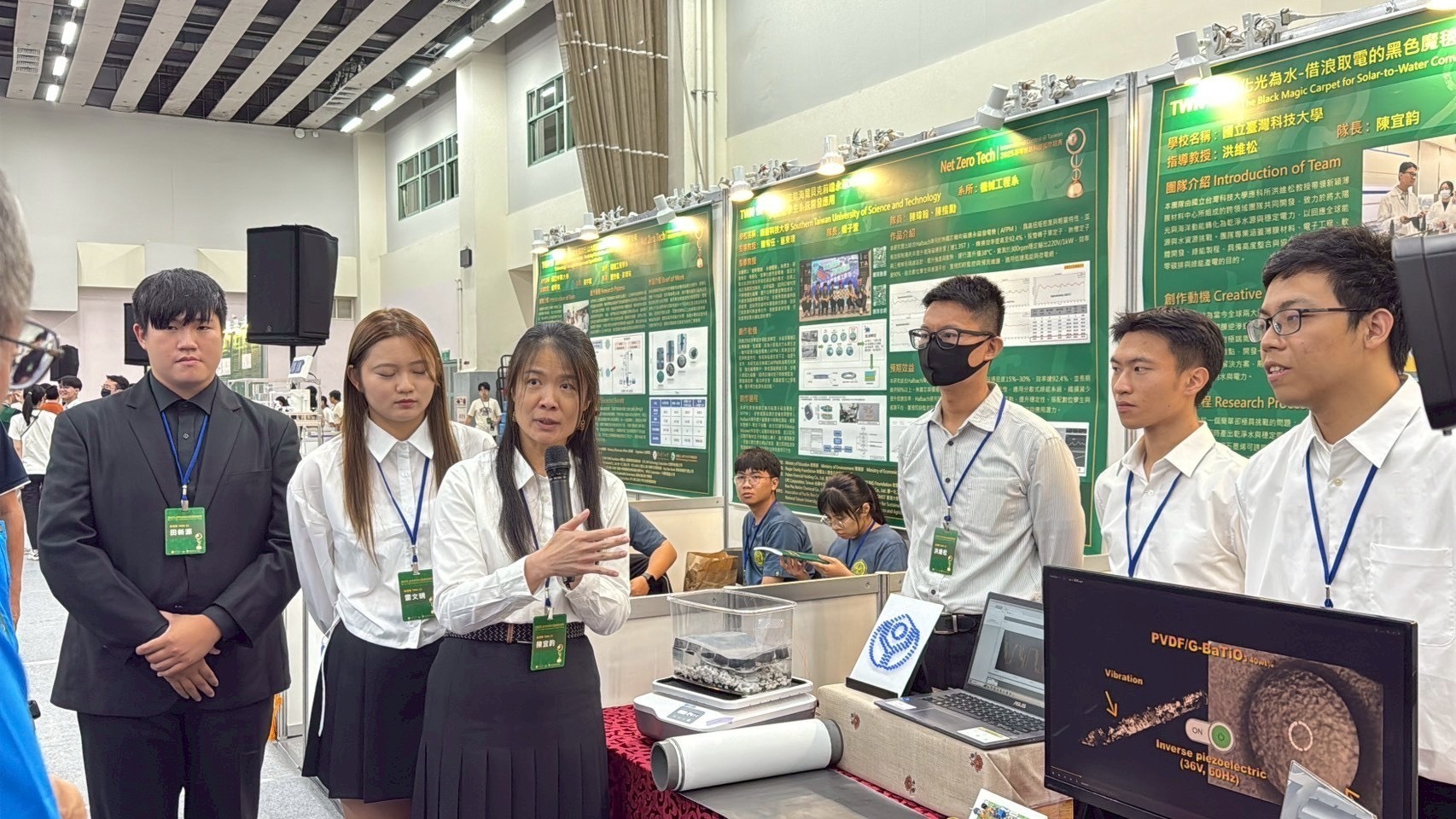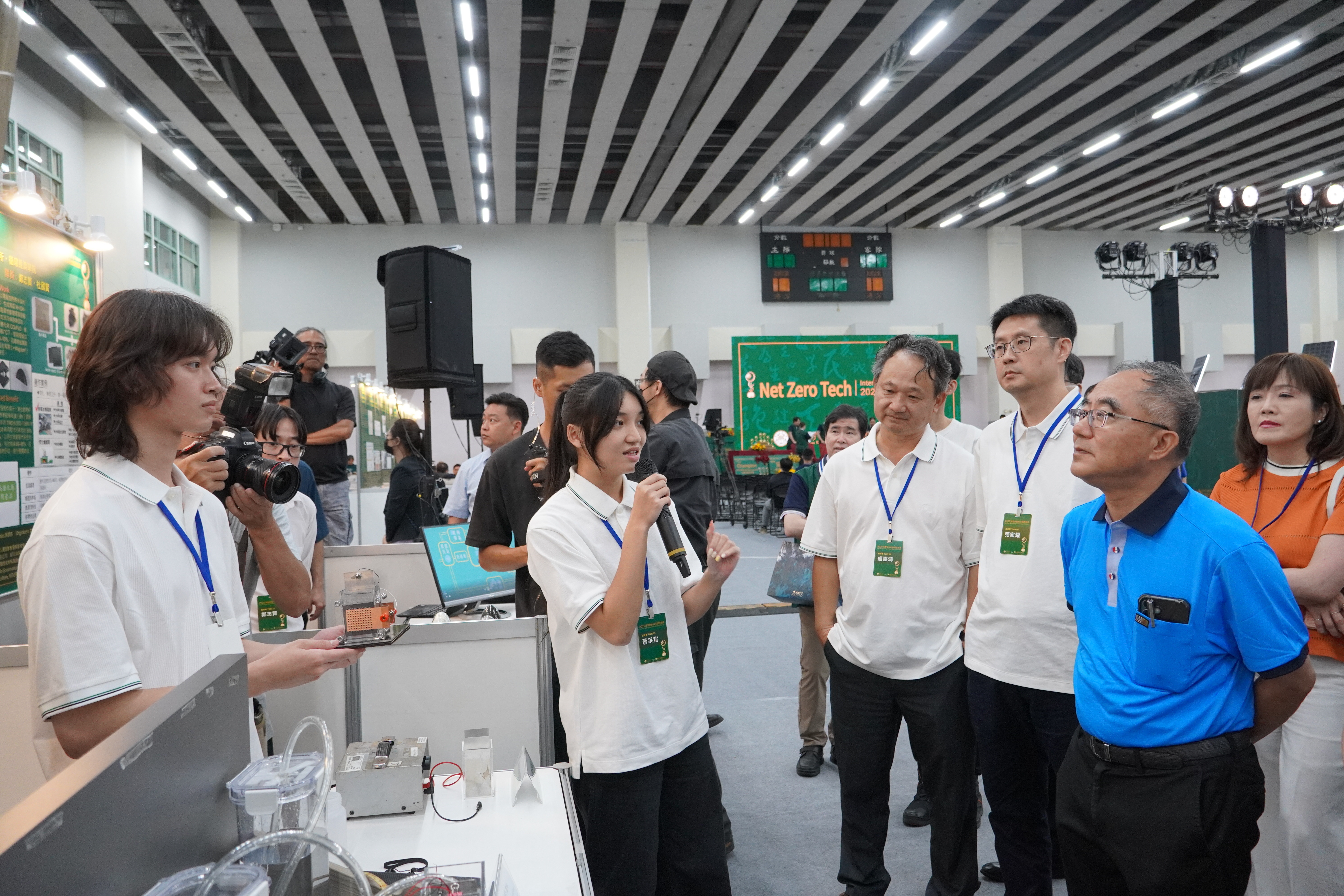Five teams reach finals, three win awards: Taiwan Tech shines at the 2025 Net Zero Competition.
At the grand final of the “2025 Net Zero Emissions Technology International Competition,” Taiwan Tech achieved an outstanding performance, standing out from among hundreds of teams. Five teams advanced to the finals, with three ultimately winning the Taiwan Division Championship, the Paujar Net-Zero Technology Award, the Best Popularity Award, and the International Division Runner-up. The total prize money amounted to NT$1.12 million, making Taiwan Tech one of the biggest winners among all participating universities.

Professor Wei-Song Hung’s team presented their competition project.

Professor Wei-Song Hung’s team received their award. The award was presented by Jerry Hsu, Chief Risk Officer of Fubon Financial Holdings (center, fifth from right).
Co-organized by National Taiwan University and the TECO Technology Foundation, the “2025 Net Zero Emissions Technology International Competition” was held with both International and Taiwan divisions. For the first time, the Association of Pacific Rim Universities (APRU) was invited as a named co-organizer. The competition attracted over 1,150 faculty members and students from 16 countries, with 92 teams registering for the International Division and 138 teams for the Taiwan Division, highlighting the scale, cross-border appeal, and influence of the event.

Professor Jia-Yaw Chang’s team presented their competition project to National Taiwan University President Wen-Chang Chen.
In the grand final, Taiwan Tech’s participating teams spanned the Graduate Institute of Applied Science and Technology, the Department of Mechanical Engineering, the Department of Materials Science and Engineering, and the Department of Chemical Engineering, showcasing strong interdisciplinary capabilities. In the International Division, Professor Fu-Ming Wang, Distinguished Professor at Graduate Institute of Applied Science and Technology led a team with the project “Lithium, From Trash to Treasure: Integrated Flow System for Scrap Battery Upcycling and Carbon Dioxide to Lithium Carbonate Conversion”, alongside Yu-Lin Kuo, Distinguished Professor(Secretary General) at Department of Mechanical Engineering with “Toward Carbon Neutral Energy Storage: Green Modification of VRFB Electrodes via Atmospheric Pressure”. In the Taiwan Division, Professor Wei-Song Hung, Professor at Graduate Institute of Applied Science and Technology entered with “Turning Light into Water – The Black Carpet Harnessing Waves for Power”, Professor Dong-Hau Kuo from Department of Materials Science and Technology with “Toward a Green Ammonia Economy: A Haber-like Process”, and Professor Jia-Yaw Chang from Department of Chemical Engineering with “Blue Future: Self-Powered Seawater Electrocoagulation Purification System”. Ultimately, Professor Wei-Song Hung’s team captured the Taiwan Division Championship and the Best Popularity Award, Professor Dong-Hau Kuo’s team received the Paujar Net Zero Technology Award, and Professor Yu-Lin Kuo won the International Division Runner-up, making Taiwan Tech one of the highlights of this year’s competition.
Reflecting on the competition, Professor Dong-Hau Kuo remarked that advancing through so many strong teams was no easy feat: “The effort and challenges we faced are hard to put into words. Variables such as experimental results, progress tracking, jury perspectives, and industry expectations all added layers of difficulty.”
Professor Wei-Song Hung admitted that beyond the technology itself, a significant amount of thought was devoted to presentation: from the intuitive wave-simulation demonstration, to a concise yet powerful slide deck, and to comprehensive and meticulously prepared written materials - every detail reflected the team’s dedication and creativity. “Especially when we discovered that the thin film could catalyze CO₂ reduction through the piezoelectric effect, it revealed the forward-looking potential of this technology,” he added.

Professor Yu-Lin Kuo’s team presented their competition project to Minister of the Ministry of Environment Chi-Ming Peng (third from right) and National Taiwan University President Wen-Chang Chen (second from right).

Professor Yu-Lin Kuo’s team received their award. The award was presented by Ginn-Shyang Lai, Chairman of Paujar Charity Foundation (center, fourth from right).
The participating students remarked that through this competition, they not only gave their all in terms of technology and experimentation, but also dedicated significant effort to preparing their presentations. Being able to have their research results recognized by both the judges and the public was, for them, a tremendous encouragement.
Now in its third year, the Net Zero Emissions Technology International Competition was co-organized this time by National Taiwan University and the TECO Technology Foundation. NTU President Wen-Chang Chen emphasized that ESG and sustainable development are shared missions of contemporary higher education. He noted that this international competition not only provides a platform for young people to showcase creativity and propose solutions for the net-zero transition, but also demonstrates Taiwan’s influence in global sustainability issues. He further suggested that future editions could include post-competition exchange activities to foster interdisciplinary interaction among faculty and students, thereby sparking more collaboration and innovation. Chih-Kung Lee, Chairman of the TECO Technology Foundation, expressed gratitude to the judges and partners for their support, stressing that this competition has already become an important global stage for elite talent in green energy and sustainable innovation.

Professor Dong-Hau Kuo's team received their award. The award was presented by the Chairman Chin-Hsiang Lai of the Paujar Charity Foundation (center).